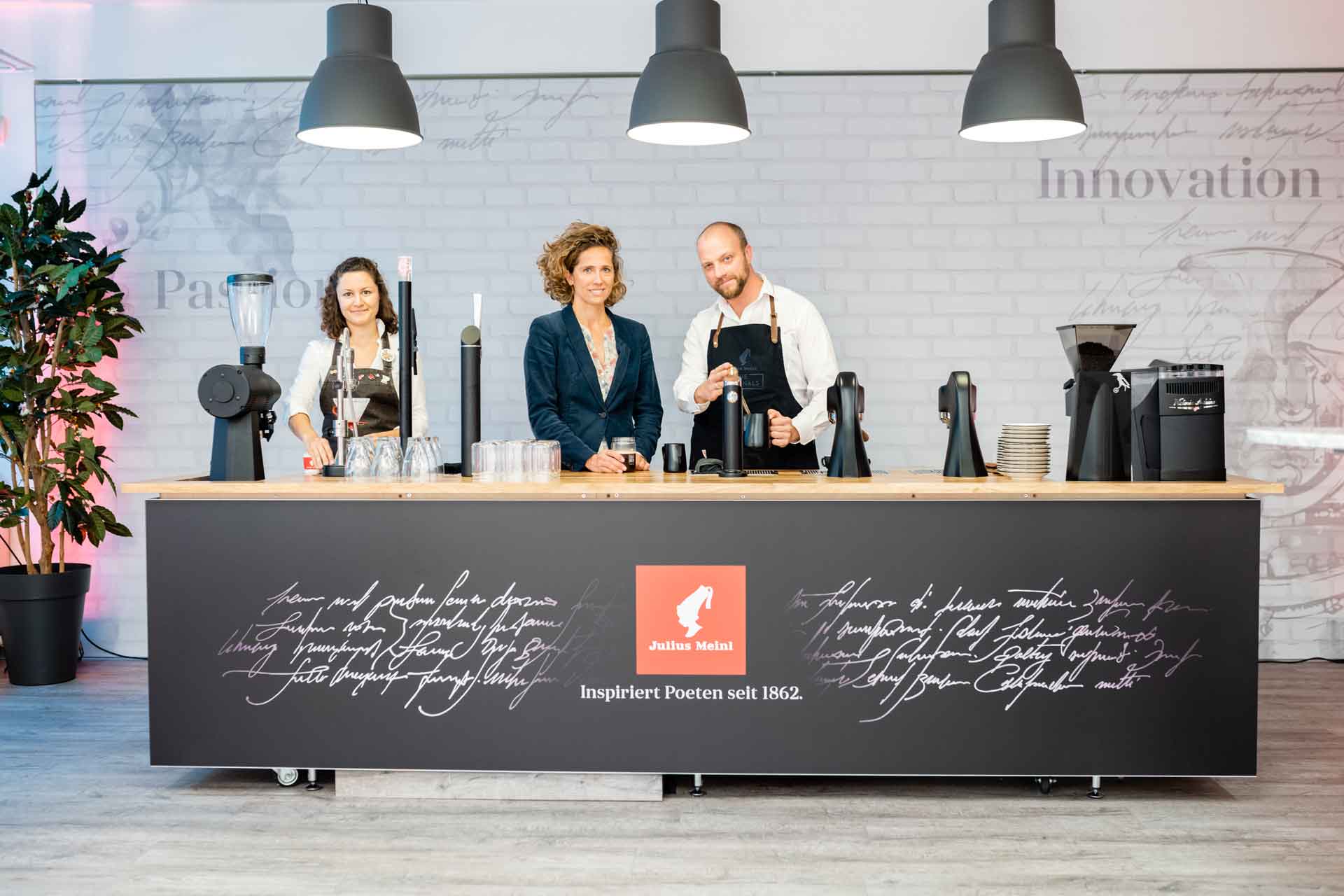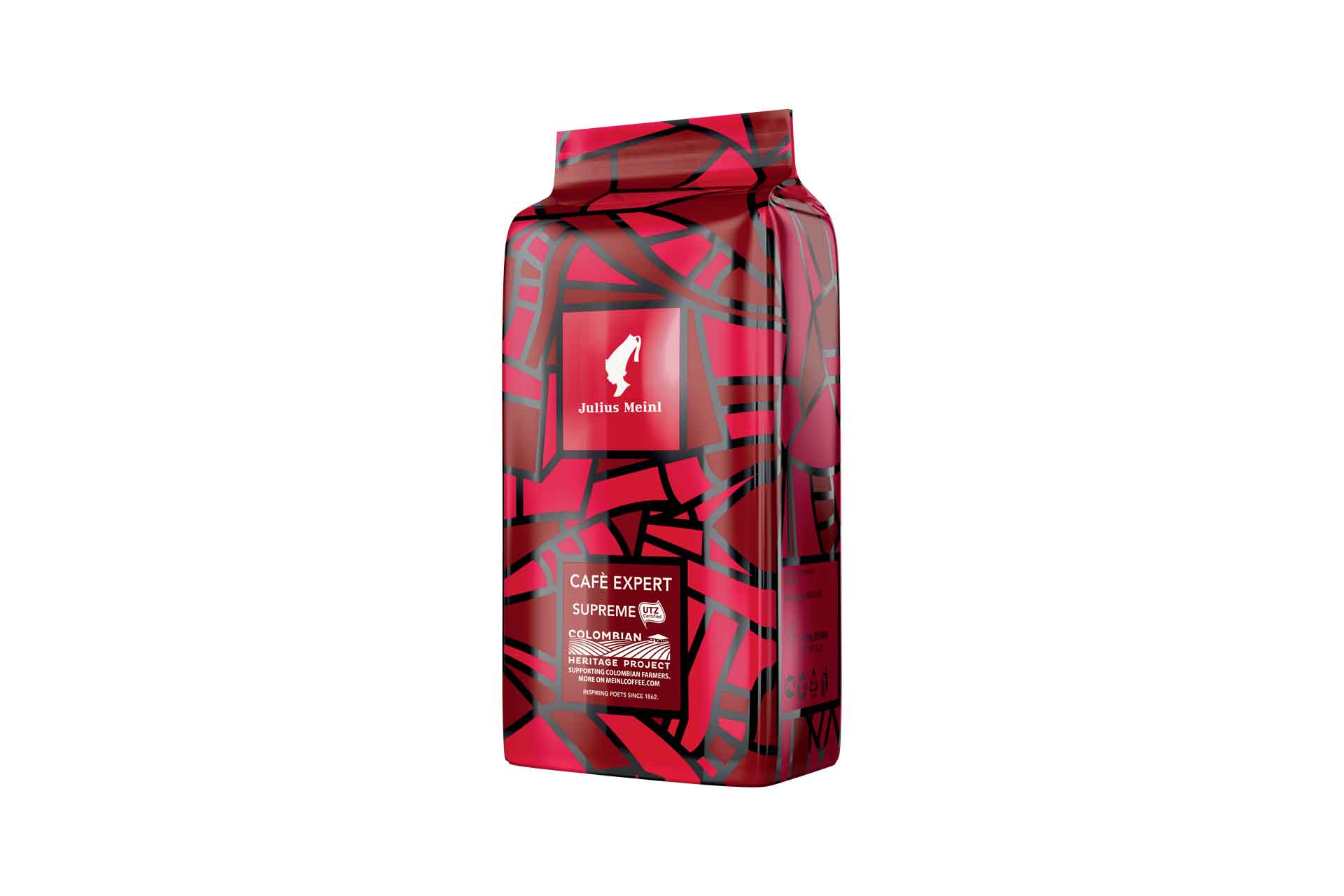Christina Meinl, Head of Innovation at Julius Meinl and President of the Speciality Coffee Association, sits down with Supper to talk about the impact of Covid-19 on the global coffee sector, how businesses are adapting to changing consumers habits, and why now, more than ever, expert coffee roasters Julius Meinl are leading the way in making the industry as sustainable as possible.
Can you give a summary of your role at Julius Meinl?
As Head of Innovation, I’m primarily responsible for managing the process of innovation Together with my team, I keep up with the latest trends, generate new ideas and provide the company with solutions for the future. Our current focus is the development of sustainable products, particularly compostable materials and zero waste concepts.
For the past 157 years, Julius Meinl has become synonymous with the highest quality coffee and bespoke service for HoReCa partners. As a fifth generation Meinl family member, I feel a responsibility for championing teamwork and growth within the company and elevating the expertise of the Julius Meinl brand within the coffee industry.
What do you seek to achieve through your role as President of the Specialty Coffee Association?
I was thrilled to be elected President of the SCA at the beginning of the year and represent specialty coffee around the world to its 14,000 members. My goals remain to boost the sustainable specialty coffee agenda, expand the SCA’s global network supporting local communities, and increase diversity within the organization.
Due to the global pandemic we have adapted our educational and events agenda to a digital format. We were very proud to conduct our Re:co symposium online. Participants were sent a home experience kit which included coffee, sensory materials and other ingredients to enhance the overall event and to ensure they didn’t miss out on the experience.

How has your role shifted within Julius Meinl and the SCA during the pandemic?
My roles at both Julius Meinl and the SCA always require flexibility, a deep understanding of industry needs and the ability to adapt modes of delivery, but this was heightened during the outbreak of Covid19. In both roles fast decision making, and teamwork became more important than ever.
SCA commissioned its own research on the impact of COVID-19 on the world coffee sector, can you talk to us about some of the main findings?
We have seen an overall decrease in consumption, mainly driven by coffee shop lockdowns around the globe, which also caused a shift towards in-home coffee drinking occasions. Another significant impact caused by the COVID-19 outbreak is increased costs, particularly for supplies, labor and hygiene measures.
The demand for high quality coffee remains globally but consumers are more likely to choose to purchase coffee to make at home. The research highlighted other changes in consumer buying behaviours such as a significant increase (5,380%) in curbside/pickup purchases, online purchases and the increase of card payments versus cash, with 26% of coffee shops declaring themselves “cashless” by late April.
What does the research suggest about the current state of the coffee industry and its future?
Unsurprisingly, given global lockdown and social distancing restrictions, there has been a significant decrease in overall sales and yet we have seen an increase in online sales proving that the consumer need for high quality coffee remains high. The challenge for companies therefore is to adapt to this new normal and discover the best way to serve their customers, whilst prioritizing the best possible in-cup quality.
Making conscious changes to the consumer journey by pivoting to online sales, extending the takeaway service offering and exploring the possibility of delivery will protect the future success of the industry.

Where is the impact being felt most across the sector?
Unfortunately, we are feeling the impact at every level of the coffee value chain. We received reports from farms who struggle to find helping hands for their coffee harvest to ships that can’t dock at major harbors. These challenges continue all the way to the end of the chain, where coffee shops suffer with many still on lockdown due to preventative measures.
How has the sector adapted its approach during the pandemic?
The sector had to react quickly, extending its customer offerings to work around the new normal of communities in lockdown. Many shops began focusing solely on walkup, takeaway sales and delivery strategies. Communication with customers, vendors and the wider business network have been key to the sectors rapid adaptations.
The report touches on the increase of at home consumption, do you think this will alter the way people drink coffee going forward or is it merely symptomatic of the current climate?
COVID-19 undoubtedly accelerated the growth in online sales however we expect the levels to remain high as the demand for high quality coffee at home exists. It is too early to predict if this will endure longer term, but the pandemic will have created lasting changes in the way people consume within the hospitality sector. Whether consumed at home, on the go or on location the demand for high quality coffee is unlikely to abate so however the consumption occasion evolves, companies must be ready to meet the demand.
What are the short-term and long-terms effects of Coronavirus on the industry?
People are being more careful with their money, with redundancies and unemployment rates constantly on the rise. Short term, the industry is likely to feel the effects of consumers having less disposable income. However longer term the consumer demand for high quality coffee as a more affordable luxury item will hopefully fuel spending in the sector. With uncertainty around a predicted second spike we may also see a sustained rise in people opting to enjoy coffee at home or on the go rather than spending prolonged time in their local shop. What we can be certain of is that no matter how the consumption of coffee is adapted, the stability of the product ensures the coffee industry will see out this crisis just like it has many before.

What has the report revealed about coffee consumption and the typical consumer?
People are spending more time in their homes than ever before and so at-home consumption will remain high. There are several factors contributing to this, from high-risk groups who need to remain inside, the normalization of remote working and those opting to skip the coffee shop in order to save money.
How has Julius Meinl reacted to these findings and how will it impact its strategies and next steps?
We used the lockdown period to develop concepts for our customers in order to make the transition to the new normal as smooth as possible. This started with a mass rollout of our Safer Coffee Preparation program that has been certified by ASIC (Austrian Society of Infection Control) that suggest new hygiene requirements. In order to prepare our partners for the reopening of their venues, we have developed our new Coffee 2 Go products which include biodegradable takeaway cups to target the increasing trend of to go consumption, continuing our ongoing efforts to operate as sustainably as possible.
Throughout this challenging time, we have worked to support our partners during lockdown as much as possible through our social channels through constant communication on everything from providing helpful tips on how to treat coffee machines to health and safety measures for staff.
In terms of next steps, we will continue to learn and adapt to serve our partners globally to the highest of standards. Focusing on flexibility and solutions is an essential prerequisite for new paths to open up: we have pushed forward on digitisation and established new distribution channels in line with ensuring all processes are set to the safest standard for the remainder of the pandemic and beyond. These things which will allow us to move in the right direction in the future.
In spite of these findings, how can businesses like Julius Meinl and bodies like the SCA continue to ensure that coffee is sustainable, equitable and a thriving activity for the value chain?
These goals remain at the heart of both the SCA’s and Julius Meinl’s mission. The global pandemic has made this mission even more critical as we know that sustainable management is an important tool for overcoming crises and one that will ensure the specialty coffee community continues to thrive.
At Julius Meinl we have established that our corporate policy of long-term, sustainable healthy growth is the right way forward. We are a family business, our values and our claim to offer the best service and the best quality have not changed since 1862 and are more important now than ever.
Get in touch with Julius Meinl here.



